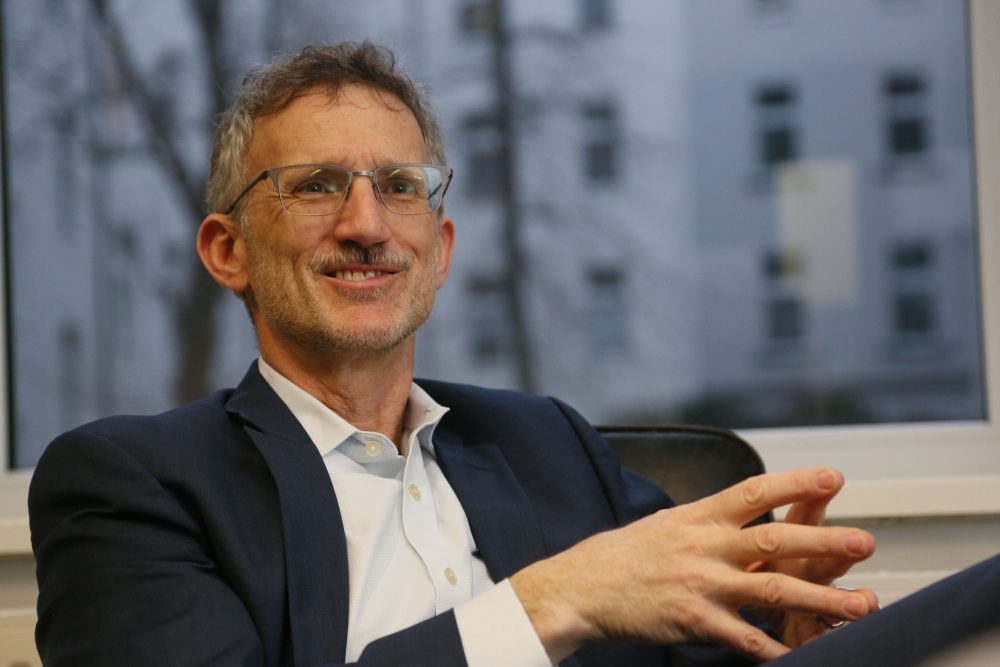
Photo by Marc Darchinger.
Ted Piccone is a Brookings Institution/Robert Bosch Foundation fellow and former Clinton Administration foreign policy advisor. Before taking part in a Zócalo/KCRW Berlin panel discussion titled “What Does Democracy Mean in the 21st Century?” held in partnership with the Villa Aurora/Thomas Mann House and the Daniel K. Inouye Institute, at the CIEE Global Institute in Berlin, he spoke in the green room about his penchant for colored socks, why he has never used Facebook, and who his influences are.
You were living in Berlin from October 2017 until February of this year, and now you’re back two weeks later. What have you missed about the city?
Not the weather! It’s hard to put your finger on the vibe here. It’s a more relaxed environment than in Washington, which is very fast-paced and stressful—especially these days. And there’s so much going on culturally and politically as Berlin becomes more and more a center of Europe—and Germany becomes the most important power in Europe. I think that makes it all the more exciting to be here. The thing I love most of all is just the history: the history that you’re just tripping over everywhere as you walk around.
Which social media do you use, and which do you not use?
I intentionally never signed up for Facebook, in part because I was worried I’d become too distracted. I know from my wife and others that I’m missing some things, particularly my family. I’m one of eight children and we have many, many nieces and nephews. I think I’m missing what’s going on. My wife catches me up.
I am using Twitter—particularly as a quick news feed. I also use it to get a sense of not only what’s happening, but who’s saying what about what’s happening. I find that useful. And I’m trying to expand my circle so that I’m hearing different voices on different debates.
I’m so old-fashioned—I still get two newspapers in hard copy in the morning, and I read them.
Was there someone who really influenced you?
At one point in my career I worked on Capitol Hill for a Pennsylvania congressman, Bob Edgar, who was a very inspiring figure. He was a Methodist minister who was a very progressive Democrat representing a Republican district outside Philadelphia, where my parents and grandparents happen to live. (It’s where my family is originally from, but I grew up in New York.) So it was both personal and political.
He was such a genuine, thoughtful, atypical politician. He had a big influence on me—on how to do politics in an honorable way.
Another was Thomas Buergenthal. He’s a survivor of Auschwitz and he managed to create a career in the United States as a human rights lawyer and professor, and ultimately became a judge on the Inter-American Court of Human Rights and the International Court of Justice. I got to work with him on the U.N. Truth Commission in El Salvador, after the civil war there. That was an extraordinary opportunity to play a little role in moving the ball forward toward peace and reconciliation. To work with him, given his personal history, made it all the more important.
Latin American is one of your fields of expertise. How did that happen?
Learning Spanish as a kid triggered it. And then in law school I got a chance to work at a human rights organization in Chile in the last months of the Pinochet dictatorship. That gave me a very on-the-ground experience of the Latin American human rights situation. It really made it come alive.
What are you reading right now?
I alternate between fiction and non-fiction, history, European, American, poetry—lots of different things. Currently I’m reading How Democracies Die, by two Harvard professors, Steven Levitsky and Daniel Ziblatt. And it’s a very important book to read right now, because they’re trying to take the Trump phenomenon and put it into the context of U.S. history, as well as some comparative history. So far I think they’re on the mark, raising a lot of the right questions and concerns. But in my fictional category I’m reading News of the World, by Paulette Jiles. It’s about Texas after Reconstruction, when there were still fights going on between white settlers and Native Americans. There’s this old gentleman who brings news of the world to these towns, but he has another job, which is to bring a German-American child who has been kidnapped by the Kiowa tribe back to her family.
What do you do to unwind?
I work out in the gym, or bicycle. Music is important.
Do you play an instrument?
I don’t; I used to play piano many years ago. But I listen to all kinds of music, from jazz to classical to Latin to electro, and old ’60s and ’70s. And cooking, to relax. When I think about times when I’m most relaxed, it’s probably in a beautiful place, with my family—I’m married, with three children—and we have a special place we go to in Maine in the summer.
So what’s with the colored socks? Do you always wear them?
It’s just trying to liven up your uniform.
Hmm, your fellow Washingtonian George Will just took a shot at colored socks in one of his columns. He suggested it was a shame that they were back in vogue.
Well, I feel better now! I used to wear a bow tie.



